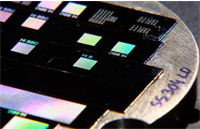25 April 2016
Heriot-Watt develops a new technique to fight counterfeiting
 BBC Scotland reports that Prof Duncan Hand and his research team at Heriot-Watt’s Centre for Innovative Manufacturing, are using high-powered lasers to etch tiny 3D holograms directly onto metal objects to create security marks that cannot be copied or peeled off.
BBC Scotland reports that Prof Duncan Hand and his research team at Heriot-Watt’s Centre for Innovative Manufacturing, are using high-powered lasers to etch tiny 3D holograms directly onto metal objects to create security marks that cannot be copied or peeled off.
The researchers are sculpting the holograms using high-powered laser pulses measured in billionths of a second. "It's about making holographic structures directly onto the surface of the metal," Duncan Hand explained, "Rather than have a stick-on hologram as you may have seen on many devices, instead inscribing that hologram directly on the surface. So it's much harder for someone to replicate it."
Dr Krystian Wlodarczyk said: "The holograms are visible to the naked eye and appear as smooth, shiny textures. They're robust to local damage and readable by using a collimated beam from a low-cost, commercially-available laser pointer, so border agencies or consumers won't need expensive technology to check an item's authenticity. We've established that we can create the holograms on a variety of metals. We're now investigating how to make them even smaller and more efficient and whether we can apply them to other materials. Recently, for instance, we have extended the process for use of such holograms on glass."
For the full BBC report go to http://www.bbc.co.uk/news/uk-scotland-35989611
- Contact Information
- Name: Duncan Hand
- Email: D.P.Hand@hw.ac.uk
- Website: www.cim-laser.ac.uk

